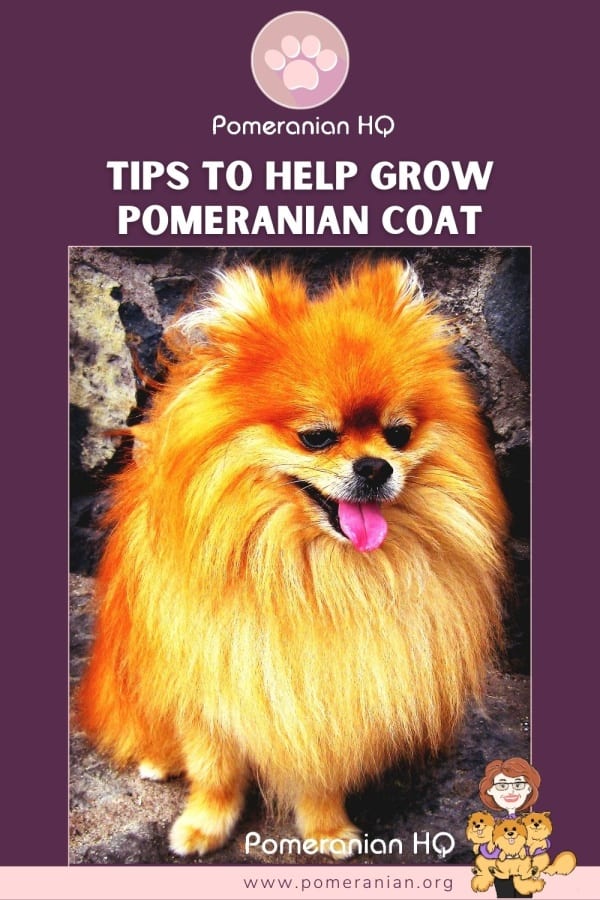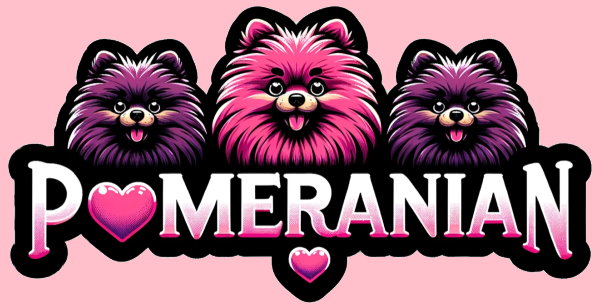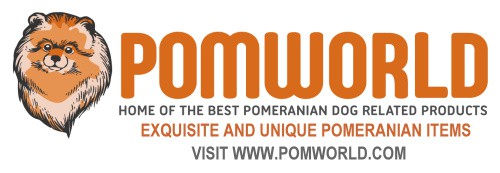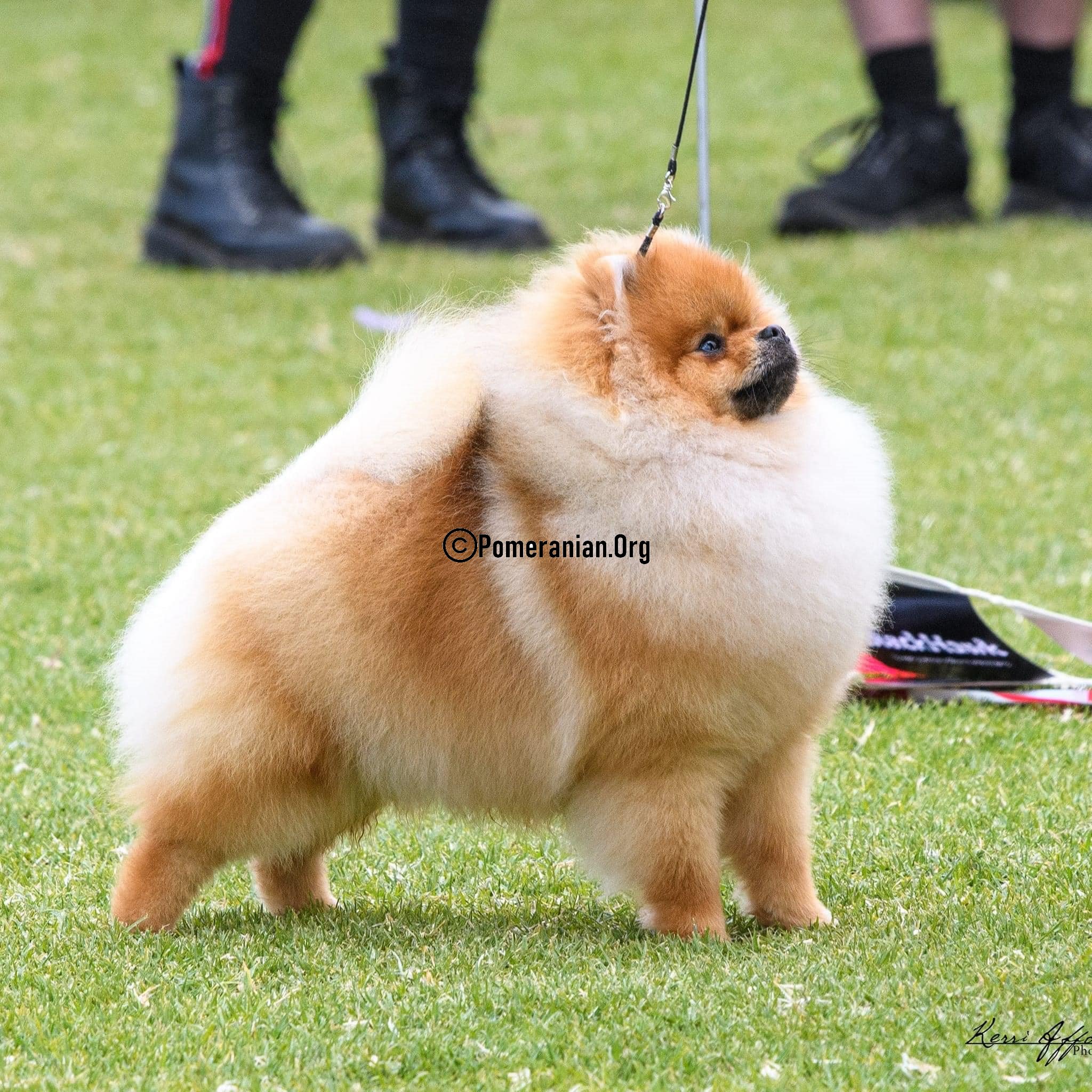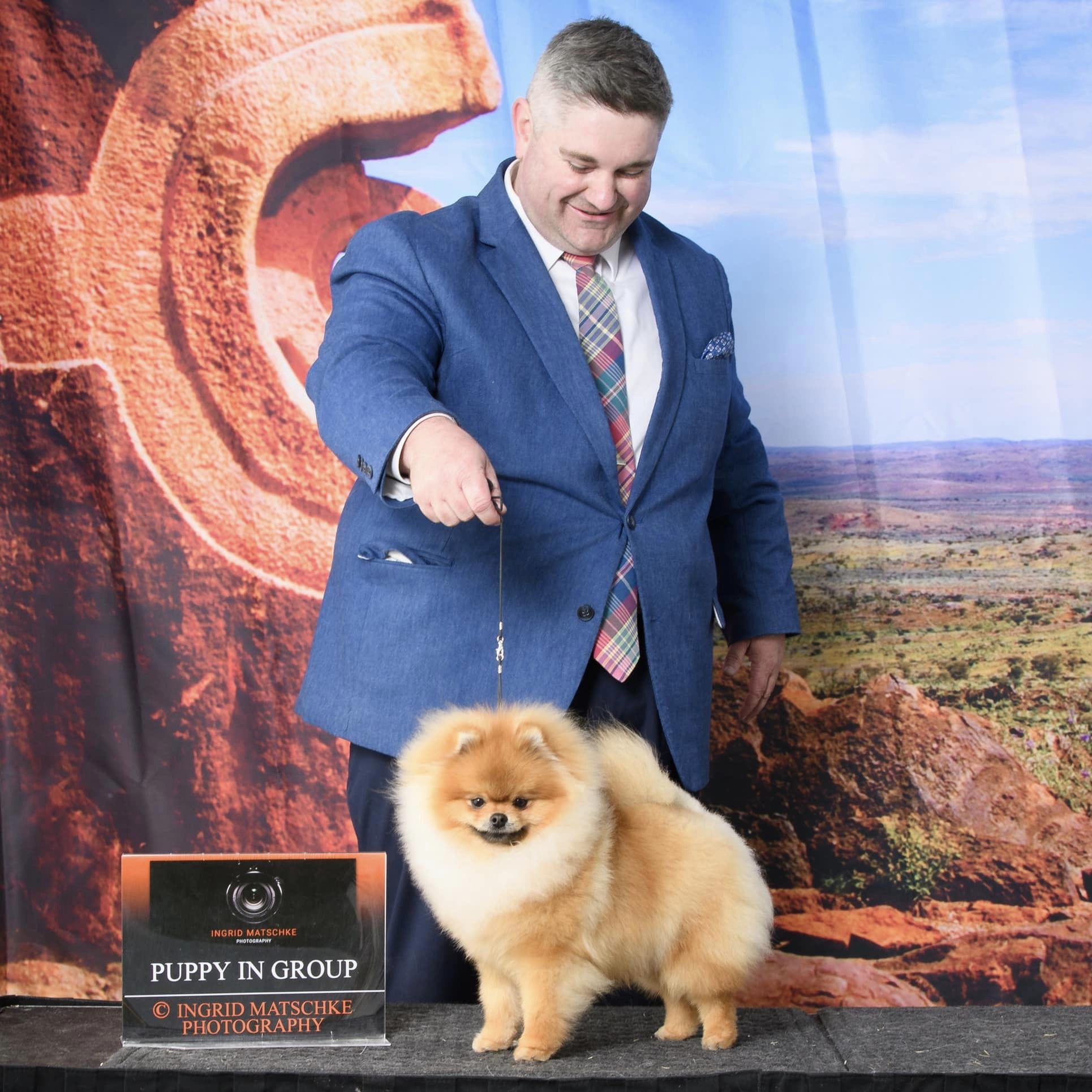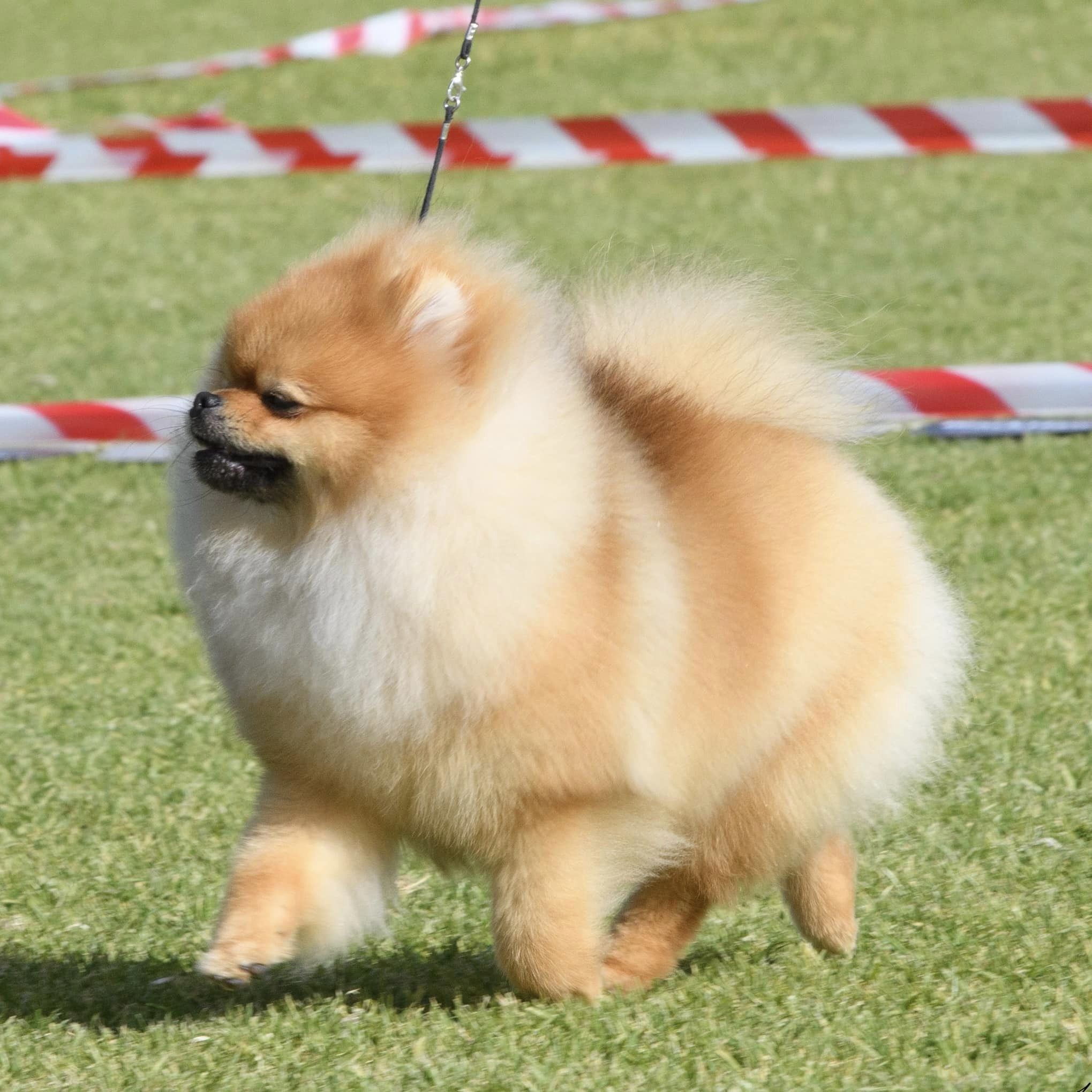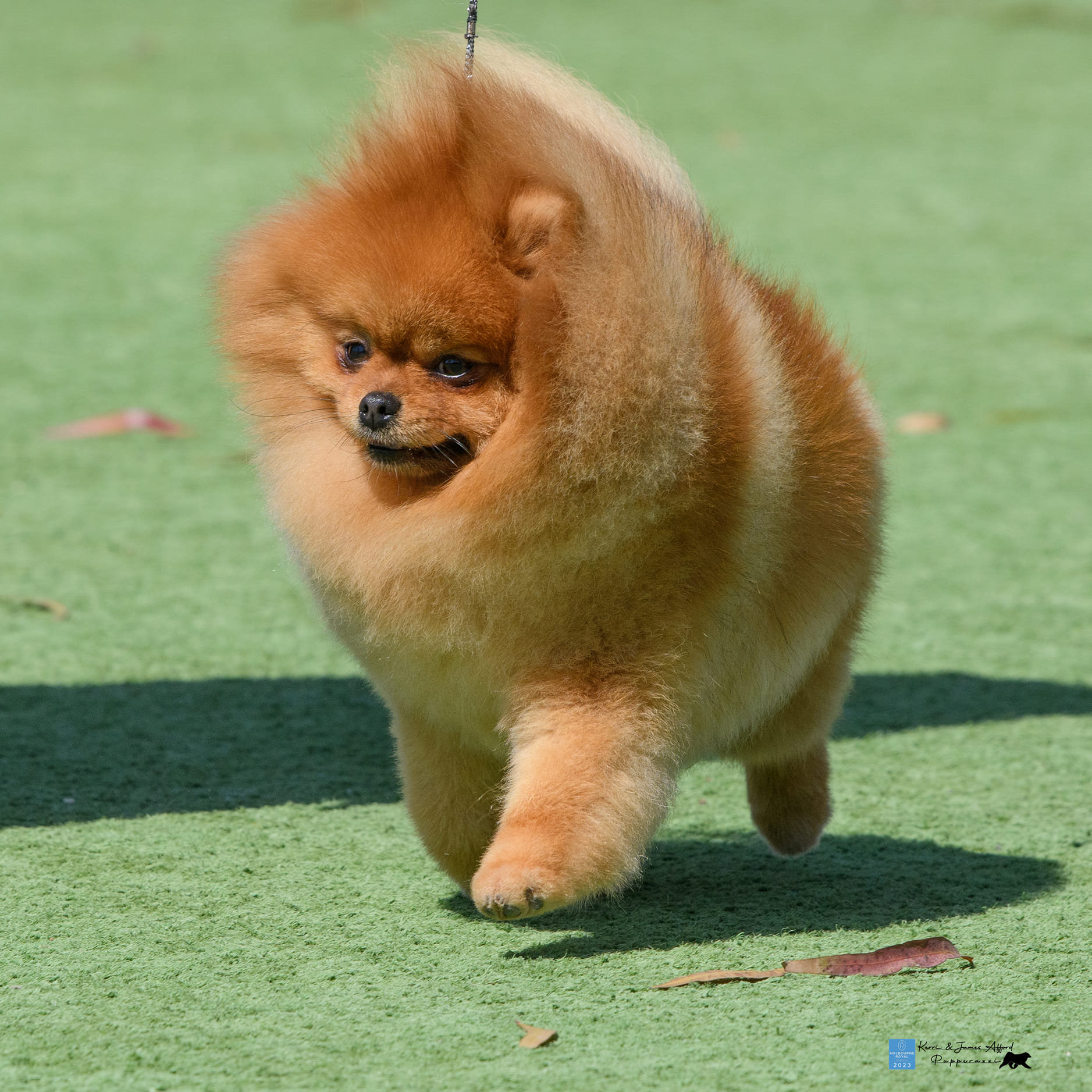Last Updated on 08/05/2023 by Dochlaggie. Post first published on April 28, 2023.
Pomeranian hair growth can be confusing for those new to the breed. Several factors influence the length and thickness of your Pom’s fur, so it is crucial to understand what they are before making any drastic changes to your dog’s diet or grooming regime.
In this article, we will dive into each factor and how it affects your Poms appearance and explain how to grow Pomeranian hair.
How to feed dog food for hair growth and how to grow dog hair back. What types of dog hair growth supplements to feed, home remedies for dog hair growth, and safe Pomeranian hair growth supplements.
Check for Pomeranian Health Issues
Your first step is to get your vet to check the Pomeranian to ensure your dog doesn’t have an underlying disease causing incorrect coat growth. Thyroid, anemia, etc., can instantly be recognized by analyzing the dog’s coat.
Pomeranian Grooming Needs
Pomeranian grooming plays a big part in dog hair growth. Does brushing hair make it grow faster?
Grooming Pomeranian hair often will prevent knots, tangles, and hair breakages, and this coat care will usually fasten hair growth. Brushing your Pomeranian’s coat should be done as often as possible.
Bathing should be done regularly. Remember dirt and grime in your Pom’s coat can prevent or hinder dog hair growth.
Pomeranian Stress
Stress can affect hair growth in dogs. People can’t claim to be the only species who feels stress, and our hair reacts accordingly. Some commercial dog foods might contain too much protein for an adult Pomeranian suffering stress due to a strenuous show campaign.
Pomeranian Shedding
Coat changes normal for your Pomeranian are seasonal molts, and Pomeranian mother’s post-weaning pups will do a complete coat drop owing to hormone changes post-whelping.
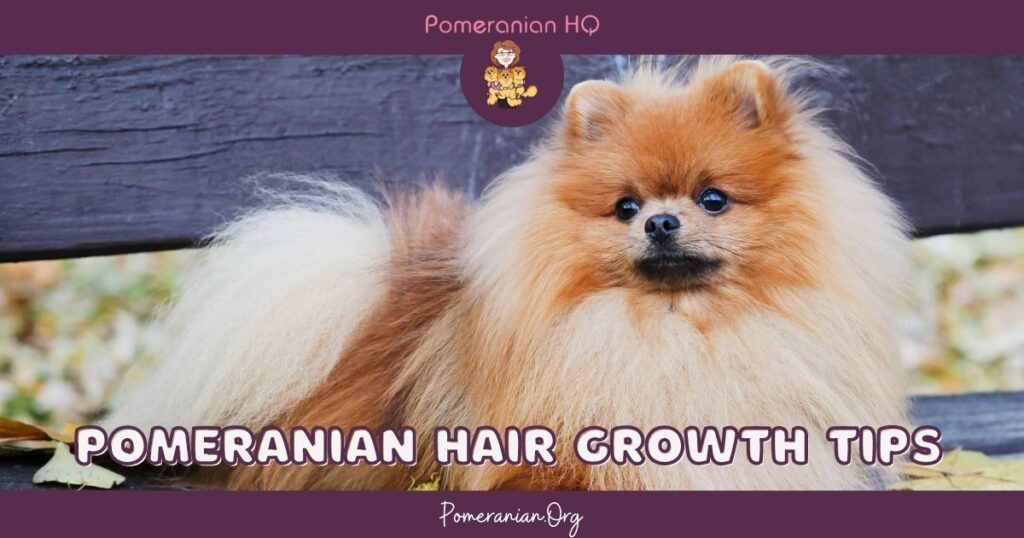
Feeding a Healthy Pomeranian Diet
There is usually a link between good health and proper dietary practices and the condition of a Pomeranian’s coat.
Changes in your pom’s coat are mostly the result of disease or lack of the correct nutrients unless your Pomeranian is doing a normal seasonal or hormonal shed.
The dog’s coat is an external manifestation of what and how food is fed and digested. External hair has a direct correlation to the level of internal health.
Giving vitamins and minerals daily seems like a great way to enhance and strengthen hair follicles as they grow.
Unfortunately, giving supplements is not enough. You need to get enough of all the proper nutrients from the food consumed. Hair is 98% protein.
My best advice to grow dog hair is to feed your Pomeranian a well-balanced diet containing healthy proteins and foods high in vitamins K, C, B, A, and E.
Dog Food for Hair Growth
As soon as you eat, the protein in your food will start working for you. Foods with lots of foods rich in protein include eggs, meat, nuts, seeds, and cheese.
Fish packs a double whammy because it’s loaded with protein, natural oils, and healthy essential fatty acids.
Vitamin B: Various scientific studies have discovered that if your Pom has a vitamin B deficiency, that can cause a range of mild to severe hair problems.
Adding vitamin B-rich foods to your pet’s diet and introducing a vitamin B complex supplement can prevent hair problems.
Foods you can add include: peas, nuts, sunflower seeds, beans, and green vegetables, as these all have high levels of the B complex family.
The complex includes niacin, thiamine, pyridoxine, biotin, folic acid, riboflavin, iron, pantothenic acid, niacinamide, inositol, choline, cobalamin, and para-aminobenzoic acid.
Some enriched vitamin B foods aren’t as popular, including brewers’ yeast, desiccated liver, raw wheat germ, and kelp.
Vitamin C: Vitamin C is full of antioxidants that fight off free radicals while assisting in cell and tissue repair and growth. It boosts your Pomeranian’s immune system and helps to metabolize amino acids and B vitamins in his body. Citrus fruits such as berries, oranges, limes, lemons, and melons are chock-full of vitamin C.
Other choices that are rich in vitamin C include tomatoes, cauliflower, Brussels sprouts, kale, red peppers, and cucumbers. However, it’s essential to be aware of any time your pet has urinary or bladder issues (including stones) because such problems can be exaggerated by adding more vitamin C to your pet’s diet.
Vitamin A: Bugs Bunny Knew Best! Bugs Bunny knew he was eating all those vitamin A-filled carrots for a good reason. Carrots work wonders on canine fur as well as people’s hair. Mix up a fresh batch of carrot juice and add a small amount of grapefruit or lemon juice to help reduce the sweetness.
Whether you feed your Pom raw or juiced liquid, carrots are full of cell-building, low-calorie vitamin A.
If your Pom does not like carrots for some reason, you can choose other foods rich in this vitamin, including squash, apricots, sweet potatoes, cantaloupe, or broccoli.
Vitamin E: Vitamin E has earned the nickname of the “healthy heart provider.” It also helps the hair grow healthily when you eat foods rich in this vitamin, such as nuts, whole grains, legumes, rice bran, avocados, and dark green vegetables.
Vitamin K: This vitamin isn‘t as well-known as the others, but it still works very hard to keep your pet healthy, especially regarding his hair.
Vitamin K helps keep bones, muscles, hair, gums, and teeth healthy. Foods with this vitamin include figs, asparagus, dairy foods, seafood, lettuce, broccoli, egg yolks, cabbage, oatmeal, soybeans, rye, yogurt wheat, liver, dark leafy green vegetables, Brussels sprouts, and brewers’ yeast.
Canine and human bodies need to have balanced iron levels. Your dog should eat poultry, meat, oysters, liver, blackstrap molasses, fish, eggs, dark leafy greens, and whole grains.
Magnesium: If your Pom has a magnesium deficiency, he may have various hair issues. Some foods with decent amounts of this mineral are fruit, fish, meat, dairy, leafy greens, nuts, whole grains, and brewers’ yeast.
Potassium: Bananas are the absolute best source of potassium. This is vital for transferring nutrients through cell membranes and is a crucial part of hormone secretion. Other sources of potassium include oranges, blackstrap molasses, kelp, meat, fish, poultry, dulse, and torula yeast.
Water: Toxins, pollutants, chemical waste, and other impurities get trapped in your Pom’s body. Water is the best way to flush it out of your beloved pet’s system.
If you can keep your Pom well hydrated and free from toxins, his liver can focus on processing all the nutrients in your body so they get to where they’re supposed to be.
Hydration is a primary reason why you shouldn’t just use water bottles. Your Pomeranian needs a real drink as often as possible. Then he can control how much he drinks and will stop when he has had enough. Most dogs that only use bottles generally end up somewhat dehydrated.
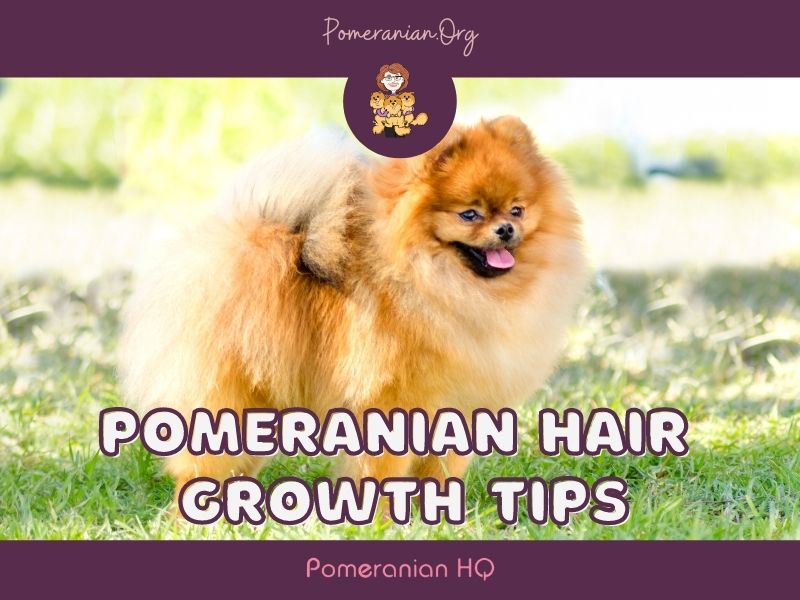
Hair Growth Supplements for Dogs
Adding Essential Fats (EFAs) to your Pomeranian’s diet is extremely important.
Apart from feeding your dog healthy food, his hair must have another two essential fatty acids that a dog’s body can’t make naturally.
These acids are Omega-3 and Omega-6. You can find Omega-3 fatty acids in dark green vegetables, pumpkin seed oil, cold-water fish, hemp oil, and algae.
Flaxseed oil has the highest natural concentration of Omega-3. Foods with Omega-6 fatty acids include sunflower seeds, borage, pumpkin seeds, corn, hemp seeds, navy beans, evening primrose oil, kidney beans, soybeans, safflower oil, and English walnuts.
A healthy coat requires cold-pressed vegetable oils, and if your dog isn’t getting any, or low amounts, of this oil, his coat can be lifeless and dull, and his skin can become rough and parched.
An ideal dog hair growth supplement is one teaspoon of cold-pressed vegetable oil added to his food each day; his coat should regain its vitality.
Pomeranian Dog Food for Hair Growth
If you combine a diet of fresh seasonal vegetables and fruit, along with plenty of protein, his coat will be fabulous in every way.
The majority of seasonal vegetables and fruits will provide the entire range of minerals, vitamins, and trace elements that your pet needs to ensure his hair and the rest of him stay as healthy as possible. Add foods rich in zinc, copper, and other natural elements of food is also very useful.
To grow and maintain healthy hair, your dog should eat seeds, raw nuts, and grains. These foods supply lots of enzymes, hormones, minerals, and vitamins not always found in processed and cooked foods.
Dogs must eat these types of foods so they don’t ever face to help them stay healthy and keep their hair just as healthy.
Although taking minerals and vitamins every day is helpful to your pet’s hair follicles and overall health, it’s critical that you feed your dog food that helps keep his hair healthy and clean.
Fresh vegetables and fruit, protein-rich foods, and other healthy foods such as molasses, wheat germ, yogurt, and honey make a big difference to your Pomeranian’s hair in terms of internal health and its external looks.
In addition to everything else, including vitamin B6, folic acid, inositol, and biotin in the range of supplements you’re giving your Pom.
Specific minerals such as silica, sulfur, magnesium, and zinc all help to keep your Pomeranian’s coat shiny and fresh. Another vitamin essential to healthy hair growth is beta-carotene because it’s turned into vitamin A when the body needs it.
It also helps maintain normal bone development and growth. Beta-carotene helps with the growth of healthy hair, nails, and skin. This vitamin is found in yellow and green fruit and vegetables.
Hair Grower for Dogs
Hair is protein; if your Pom’s diet doesn’t have enough protein, the hair may become thinner than normal or won’t grow properly. On the other hand, if your Pomeranian eats enough quality protein, his hair will grow faster and healthier.
Various nutritionists recommend using a mix of brewers’ yeast, calves’ liver, wheat germ, and two tablespoons of granulated lecithin to help your Pom’s hair to grow well, look well, and be strong.
Other great protein sources include yogurt, fish, beans, and eggs. Soy protein is also a proven hair growth stimulant.
One particular study conducted on soy on dog hair demonstrated that it grows well and becomes stronger. Tofu is a terrific soy source.
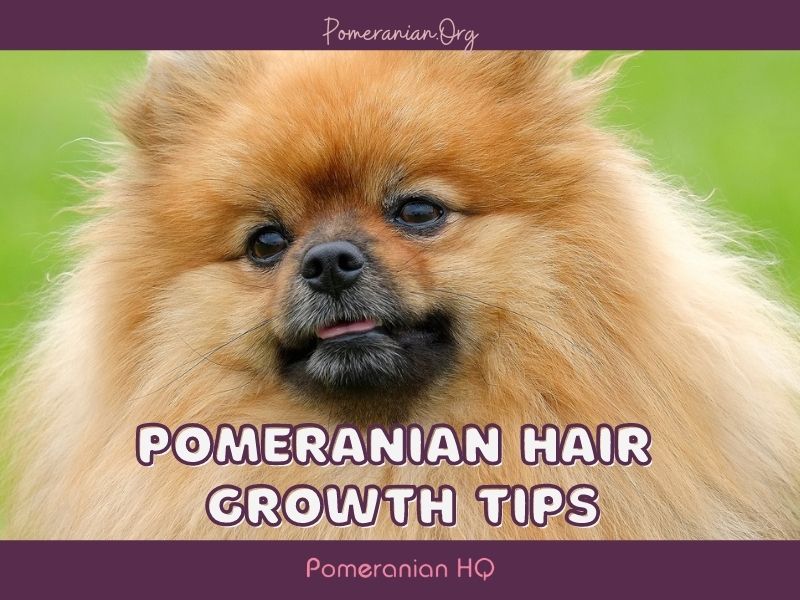
Tips to Help Grow a Pomeranian’s Coat:
- Feed your Pomeranian a healthy, varied diet and avoid foods with lots of fat or sugar.
- Treat your Pom’s coat like you would treat fine, very old lace. Avoid unnecessary handling, combing, or brushing.
- Have a good bathing routine in place.
- Avoid using hot water, hot settings on a hair dryer, and other hair care gadgets that can stress the hair.
- Add a good probiotic to the dog’s diet.
- Regularly trim long coats to avoid having split ends; your dog’s coat will feel and look much healthier.
- Give your dog’s coat a weekly massage with warm oil because this stimulates the hair follicles and helps protect the shafts of the hair.
- DON’T clog up your dog’s follicle pores with oil and other products.
Growing Coat Conclusion
With the help of these simple tips, you can take care of your Pomeranian’s fur so it will grow to its full potential. Read on for more information about what owners need to know when caring for their Poms’ hair.
In this blog post, I have answered common questions from owners who want to keep their Pom looking and feeling great every day.
We hope our advice has helped you decide how best to care for your furry friend. If you have any other queries or need additional guidance, don’t hesitate to contact me.
Please note: while I do discuss health, care, and behavioral issues, you should never use this information as a replacement for advice from qualified veterinarians, diagnoses, or recommended treatment regimes. If you have any worries about the health of your Pomeranian, your first contact should be your regular vet or, if you don’t yet have one, a vet that works locally. Never ignore or avoid treatment and advice from your vet because of a piece of information you have read on any website.
Copyright Pomeranian.Org. All Rights Reserved.
References and Further Reading:
[1] Official Standard of the Pomeranian (AKC). American Kennel Club, 2011.
[2] English Kennel Club Pomeranian Breed Standard, 2017.
[3] Denise Leo, The Pomeranian Handbook.
[4] Milo G. Denlinger “The Complete Pomeranian.”
[5] Kimbering Pomeranians “1891-1991”.
[6] William Taplin’s “The Sportsman’s Cabinet.”
[7] E. Parker “The Popular Pomeranian.”
[8] Lilla Ives “Show Pomeranians.”
